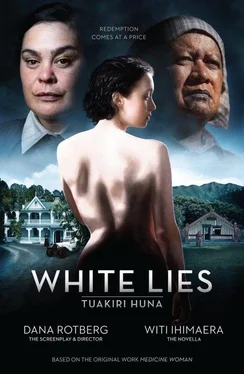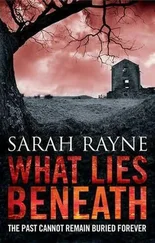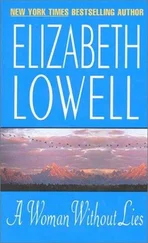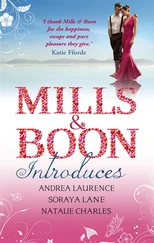Paraiti ignores the threat. ‘Your trial will soon be over,’ she answers, ‘and it will be advisable for you to focus on the difficulties ahead. A normal birth is difficult enough. One that has been induced as forcefully as this is more so.’
Yes, Rebecca Vickers has stamina all right but, even so, she is being truly tested. She is dressed in a white slip, the cloth already stained at her thighs. Her skin shines with a film of sweat.
‘You wish to be delivered of the baby here?’ Paraiti asks.
‘Here, fool?’ Mrs Vickers asks. ‘In my matrimonial bed where I would be reminded of the birth of an illegitimate child every time I sleep in this room?’ She motions to Maraea to help her up.
‘How do you wish to give birth, Mrs Vickers?’ Paraiti asks. ‘The Maori way or the Pakeha way?’ She knows the question has a hint of insolence about it, but, after all, Mrs Vickers has Maori ancestry and it needs to be asked. The Pakeha position is prone, unnatural; even so, Paraiti assumes that this is the way Mrs Vickers would wish the baby to be delivered.
Her answer, however, surprises Paraiti. ‘My mother has prepared a place so that I can deliver the Maori way,’ she says. ‘What does it matter? The child will be born dead anyway.’
It is a slip of the tongue, accidental. However, her next words are not.
‘If it was good enough for my mother’s child,’ she says, looking at Maraea, ‘it is good enough for mine.’

Maraea? Mrs Vickers’ mother?
‘You stupid girl,’ Maraea says, looking at Paraiti.
‘Oh, what does it matter if Scarface knows,’ Mrs Vickers answers. ‘She is of no consequence.’
Who holds the upper hand here? All this time Paraiti had thought that Mrs Vickers was the dominant one. ‘Ko koe te mama?’ she asks Maraea, and she looks at the older woman to affirm the relationship.
Maraea holds her gaze. She nods briefly. ‘Yes, I am Ripeka’s mother. And it would be best if you held this knowledge to yourself …’
‘Or what?’ Within the words is an implied threat.
Maraea retreats, puts on the garb of subservience. ‘I never thought the pathway would lead to this, Scarface, believe me.’ There is no resemblance at all. One is old, dark, seemingly indecisive; the other young, fair, purposeful. Or is the old one as passive as she would lead you to believe? What kind of unholy relationship, what kind of charade, is this between daughter and mother?
Paraiti refuses to let Maraea get away that easily. ‘You call yourself a Maori. You are nothing.’
Maraea rears at her. ‘Don’t you judge me, Scarface. You live safely among your own; you try to survive in a world that is not your own. I have done what every mother, Maori or not, would do: give my daughter every chance at success. Her success is my success.’
Clearly, the painting on the landing is a lie. It is not Rebecca’s mother at all, but simply a ruse to put people off the scent.
Rebecca Vickers gives a guttural moan. ‘Take me to the birthing place. Quickly.’
Leading the way, and supporting her daughter as she goes, Maraea beckons Paraiti down the stairs to the ground floor of the house. Through the kitchen they go to a set of doors leading to an underground basement. There’s a circular staircase and then a further set of steps to a small cellar.
‘This is the place,’ Maraea says, switching on a light. The cellar is a large hole cut out of the dark, wet clay, barely high enough to stand up in. It is where Mr Vickers stores his vintage wine.
Paraiti sees that Maraea has done her work well. Two hand posts have been dug into the clay, and beneath the place where Mrs Vickers will squat are clean cotton blankets and a large sheet to wrap the baby in.
With a cry of relief, Rebecca Vickers shrugs off her slip and, naked, takes her place between the posts in a squatting position, thighs apart. Her pendulous breasts are already leaking milk. ‘No, I won’t need those,’ she says to Maraea, refusing the thongs that her mother wants to bind her hands with. ‘Do your work, Scarface,’ she pants, ‘and make it quick.’
Maraea has already taken a position behind her, supporting her.
‘Massage your daughter,’ Paraiti commands. ‘Press hard on her lower abdomen and whare tangata so that the baby is prompted to move further downward.’
The whare tangata is collapsing. But there is a heartbeat — faint, but a sign that the baby has survived the rigours of the internal punishment.
‘I am here, child,’ Paraiti whispers. ‘Kia tere, come quickly now.’ She takes her own position, facing Rebecca Vickers, and presses her knees against her chest. In this supreme moment of childbirth, the young woman is truly transformed: Mother Incarnate, her red hair is plastered to her skull, sweat is beading her forehead and her entire body streams with body fluids. She is magnificent.
‘You will pay for this,’ she says. Suddenly her face is in rictus. She takes a deep breath, her mouth opens in surprise and her groan seems to echo down to the very moment of the creation of the world. She is one mother, but she is all mothers.
Paraiti places her hands on Mrs Vickers’ swollen belly. Oh, the baby is too slow, too slow, so she must administer a series of sharp, forceful blows — one, two, three, four — to give it the impetus to kick itself outward with its last remaining strength.
The baby pushes head first against the birth opening.
Paraiti’s manipulation is firm and vigorous. The contractions are rippling stronger and stronger, and the fluids stream from the vagina as the doorway proudly begins to open. ‘Now, bear down,’ Paraiti orders.
Mrs Vickers does not flail the air. Her face constricts and she arches her neck with a hiss. With a gush of blood, undulation after undulation, the baby slides out, head followed by shoulders, body and limbs, into the world. The baby is dark-skinned with wet, matted red hair.
‘A girl,’ Paraiti whispers in awe. ‘Haere mai, e hine, ki Te Ao o Tane. Welcome, child, to the world of humankind.’ Quickly, she cradles the child, wiping the mucus from her face to give her the first breath of life from one generation to the other.
She feels Maraea’s fingers digging into her, pulling her back. ‘No, let it die.’
Paraiti pushes her away. Alarmed, she notices that the baby is very still. She clears the baby’s mouth and massages her chest.
Still no movement.
Maraea is on her with a growl, but Paraiti pushes her away again. She breathes through the child’s nose and mouth and then gives the ha , the blessing through the fontanelle.
The baby cries. Her eyes open. They are green, shining, angry.
‘Oh,’ Mrs Vickers whispers.
Rebecca Vickers motions for Paraiti to give the baby to her.
When Paraiti looks at her, she realises Mrs Vickers has been surprised into love.
‘Look, Mother,’ she says to Maraea.
Paraiti has brought with her a sharp cutting shell to sever the umbilical cord. ‘Hui e, haumi e, taiki e,’ she whispers. ‘Let it be done.’
She ties the cord with flax. She closes her eyes, feeling suddenly tired. When she opens them, she sees that Mrs Vickers is weeping. Where is the child?
‘My mother has taken it. It had no future anyway.’

All along Paraiti should have realised.
When Maraea had said, on their second meeting, ‘She will kill the baby, make no mistake about it’, what she had really meant was that she, the mother and not the daughter, would kill it. The baby’s birth threatened not only Rebecca’s life but Maraea’s too, and she wasn’t about to let it be destroyed.
Читать дальше













